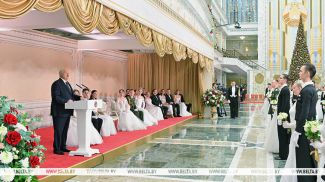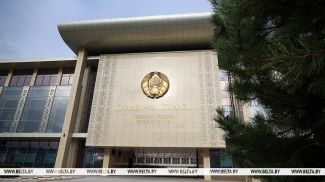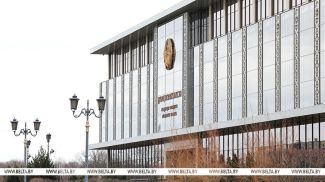MINSK, 27 November (BelTA) - When meeting with the staff of Minsk City Clinical Hospital No. 6 Belarus President Aleksandr Lukashenko cited excerpts from the reports of the special services regarding the attitude of Western politicians to the events in Belarus and their plans for the country, BelTA has learned.
According to the head of state, he received the information “about what is happening around Belarus” from the State Security Committee just the day before the visit. “These are the originals,” the president said.
Mid-August. What do they talk about in Warsaw after the presidential election in Belarus?
Aleksandr Lukashenko quoted the Polish prime minister: "The future of Belarus is of great importance for Poland. The western territories of Belarus historically belong to Poland… Warsaw has taken many concrete steps to help the Belarusian revolution: provided financial support through Polish and Polish-American programs of solidarity with the victims of the Lukashenko regime, invited Belarusian students, eased the border crossing rules, and provided support for independent media and NGOs.”
According to the president, the Polish officials call on NATO to establish special security forces in the armies of the Baltic states and Poland. According to the plan, these forces could be used to fight against the Belarusian authorities. “The successful revolution in Belarus is also in Poland's national interests,” Aleksandr Lukashenko continued quoting the Polish prime minister.
Late August. Poland proposes to create an artificial crisis in Belarus
The president said: “This conversation took place on 31 August: ‘It is still early for the direct talks between the regime and the opposition. Lukashenko's regime is still too united, the army and KGB support him, and workers do not support any revolution at all. We need to wait and watch the situation unfold.'
According to the head of state, Poland proposed to create a situation in Belarus in which the country's economy collapses, the national currency depreciates and store shelves go empty. “We need to convince Turkey, Greece, Azerbaijan, and Armenia not to export food products because of the coronavirus situation,” the president voiced the plans of Poland.
Mid-September. Poland changes plans after failed coup in Belarus
Aleksandr Lukashenko said that in September the Polish government came to the conclusion that it was impossible to change the situation in Belarus by military force.
“However, we have to be prepared for this scenario in any case. We have to address two problems. First of all, we must get prepared for a military solution to the problem, launch the appropriate mechanisms that are necessary for this. Secondly, we must show Russia that we are against it using any armed forces in Belarus,” they said in Poland.
End of September. What does the Belarusian opposition offer to the West?
During the meeting, Aleksandr Lukashenko also cited excerpts from Pavel Latushko's conversation with the Czech minister of foreign affairs. According to Latushko, “the democratic opposition has never had such good chances to overthrow the dictatorship in Belarus as it does now”. He spoke of the need for international recognition of the so-called coordinating council. “The coordinating council believes that the main goal is to isolate the process of constitutional reform proposed by Lukashenko,” the president continued.
“They don't need any constitution, they don't need any constitutional changes,” the head of state stressed. “If we adopt a new Constitution, powers will be shared between different branches. Meanwhile they need a president with the current powers.”
According to the head of state, the coordinating council advocated a military solution to the situation in Belarus during contacts with the West.
October. Poland wants to shift attention from domestic problems to Belarus
In October, Poland faced a political crisis. The pandemic led to economic problems. “The government needs alternative solutions. It is necessary to use the revolution in Belarus to our advantage. If Putin wants to normalize relations with the West, he must give up on Lukashenko,” the president quoted the Polish prime minister as saying. He called these statements as particularly cynical and unique.
Aleksandr Lukashenko said that he had never asked the Russian authorities for help. According to the head of state, Vladimir Putin, having learned about the events in Belarus, offered the help himself. He understood that Russia would be next.
November. Ukraine joins the fight against Belarus
The information provided by the KGB also contained a part of the conversation between the Ukrainian minister of foreign affairs and his German counterpart: “We are losing the momentum without taking decisive steps. The European Union should impose sanctions against Belarus to paralyze the state, business and industry.”
“What is their interest here?” the president expressed his surprise. “Even Russians have always asked me: “Why do you support Ukrainians?” he added.
However, despite brotherly relations between the Belarusian and Ukrainian people, a center of information influence on Belarus has been set up near Kiev, Aleksandr Lukashenko said. “Ordinary Ukrainians treat us very well, because we treat them the same. However, it is so cynical of them: ‘we need to catch up, we have to destroy Belarus as quickly as possible',” he added.
The head of state also read out the speech of one of the EU foreign ministers at the meeting held ahead of the presidential election in Moldova: “We plan to oust Russia out of Ukraine and Moldova. We will promote the integration of these countries into NATO, perhaps even within the Eastern Partnership.”
Speaking at the same meeting was a representative of the United States: “In Russia we want to accelerate the disintegration process: local authorities should receive more powers, while the powers of the central government should be curbed. We will support the internal conflict in the Russian society. The current leadership in Russia may lose power due to events in Belarus.”
The president stressed that the West is interested in the crisis in Belarus in order to weaken Russia. The EU politicians view it as a historic chance to undermine Russia's influence. “This is their ultimate goal, and we are a barrier on this path. They want to test it in our country,” Aleksandr Lukashenko noted.
However, according to the head of state, some leaders of the European Union countries positively assess the power structure in Belarus. The president did not name them, but read out some excerpts: “Belarus is pursuing the right policy, keeping its economy in the hands of the state. Belarus would not exist without a strong power vertical. We are pursuing our national development goals, with state-owned companies and banks at the heart of it. President Lukashenko understands it right that there must be unity in the leadership. We must learn from the experience of Belarus, we must have a strong ideological basis.”
Aleksandr Lukashenko explained that he shared this information so that people could understand his intentions and actions. “It should also encourage some people to assess their own actions,” he added.
The president stressed that Belarus is capable of responding to aggression, including military aggression. “We all want sovereignty and independence, but independence is a very expensive thing. If the Belarusian people are ready to maintain this independence, to fight for it, no matter what it takes, let's fight. Otherwise, we will be thrown back, deprived of what we have, and will be forced to toil and moil for somebody else. That's how I feel. Hence my actions,” he head of state noted.













